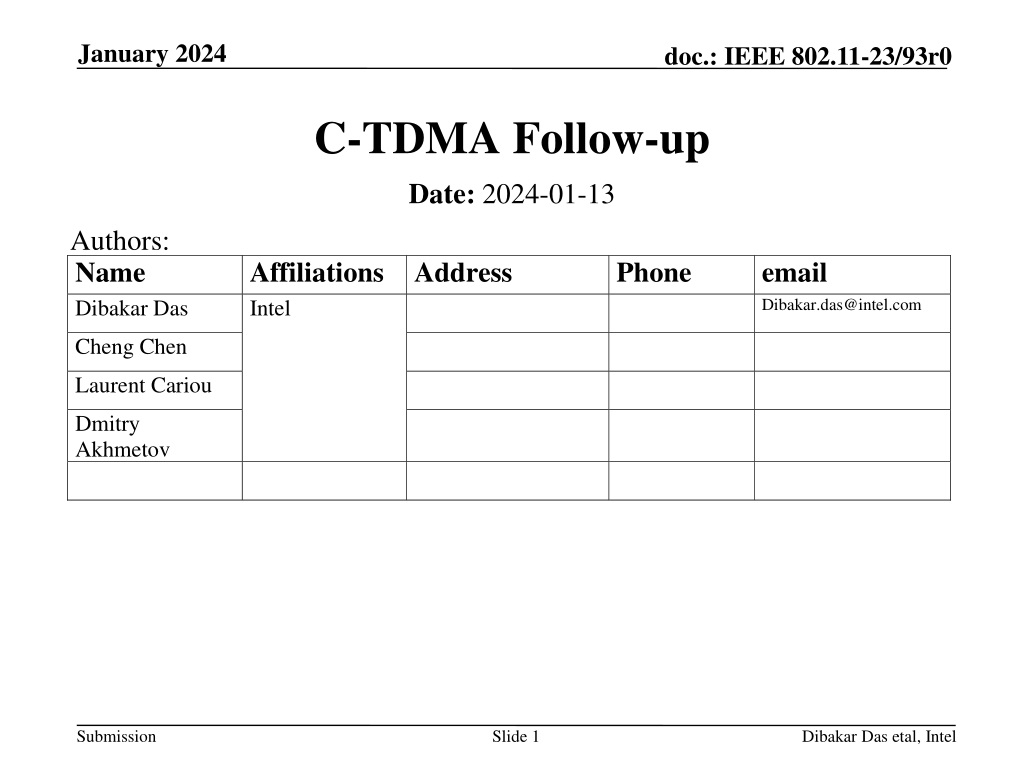

0 likes | 11 Views
This document addresses NAV protection rules and fairness concerns in the context of C-TDMA for IEEE 802.11. It discusses issues related to allowing legacy STAs to respond to transmissions from coordinated APs, proposing solutions to ensure fair resource allocation and prevent unfair airtime advantages for certain APs. The proposed solution involves setting basic NAV for STAs during allocated time and limiting time allocation of shared APs to maintain fairness.

E N D
January 2024 doc.: IEEE 802.11-23/93r0 C-TDMA Follow-up Date: 2024-01-13 Authors: Name Dibakar Das Affiliations Address Intel Phone email Dibakar.das@intel.com Cheng Chen Laurent Cariou Dmitry Akhmetov Submission Slide 1 Dibakar Das etal, Intel
January 2024 doc.: IEEE 802.11-23/93r0 Introduction • There has been several contributions on C-TDMA including one from us. • The main idea is to allocate time for one shared AP at a time similar to the TXS procedure in 11be. • Here, we focus on the problem of NAV protection rules and fairness: • How to allocate time to a shared AP without inadvertently setting NAV for that AP’s BSS ? • How to make the scheme fairer to other STAs esp. legacy ones which cant be allocated resources ? Submission Slide 2 Dibakar Das etal, Intel
January 2024 doc.: IEEE 802.11-23/93r0 NAV protection rules in C-TDMA Based on the discussions in wifi-7 and some proposals in wifi-8, for C- TDMA there are two somewhat contradictory issues: • (Issue 1) To allow legacy STAs associated to coordinated APs to be able to a) respond to a Basic TF sent from coordinated APs during the allocated time, b) respond to an RTS sent by the coordinated AP in the same way as it would if the coordinated AP obtained TXOP doing EDCA => need to ensure that NAV set by frame transmissions from Coordinator AP does not prevent this. • (Issue 2) To increase probability of the coordinator AP not losing its obtained TXOP during the allocated time because a STA hidden to the coordinated AP’s BSS observes medium to be idle and obtains TXOP. Any solution for issue 2 likely to be more complex and introduce a bit unfairness as the sharing AP will set NAV beyond its immediate BSS and block the medium. So, prefer to just focus on issue 1 for simplicity. • • • Submission Slide 3 Dibakar Das etal, Intel
January 2024 doc.: IEEE 802.11-23/93r0 NAV protection rules in C-TDMA (contd.) o Proposal: The M-AP TF from sharing AP (AP-0) sets basic NAV for any STA only till the duration of that TF + SIFS+ duration of an immediate response frame + {a small time needed for the shared AP to initiate own transmission}. o After the allocation ends, the sharing AP performs CS check (similar to TXS) to determine if it can continue the TXOP o In congested environments where the sharing AP will likely find medium busy at end of allocation, the sharing AP will o finish its own transmissions before allocating to another AP, o guarantee time allocation to one shared AP Submission Dibakar Das etal, Intel
January 2024 doc.: IEEE 802.11-23/93r0 NAV protection rules in C-TDMA (contd.) Max TXOP length CS check: medium idle TALLOC TNAV M-AP TF (Duration = TNAV) In-BSS transmissions New frame Sharing AP- 0 CTS Frame exchanges within BSS of AP-1 Shared AP 1 Max TXOP length CS check: medium busy => abort TXOP TALLOC TNAV M-AP TF (Duration = TNAV) In-BSS transmissions SharingAP-0 EDCA CTS Frame exchanges within BSS of AP-1 Shared AP 1 Submission Dibakar Das etal, Intel
January 2024 doc.: IEEE 802.11-23/93r0 Fairness issues for C-TDMA The concern is a given AP might get additional airtime through C-TDMA in addition to baseline EDCA mechanisms which in turn reduces airtime for legacy STAs. Since the problem mainly comes from sharing AP giving up time beyond its own need to another STA, a simple solution could be to bound this time allocation. We therefore propose to limit the aggregate time allocation by a sharing AP in any TXOP to other shared AP(s) to X % of the time used by that AP for transmission within own BSS. • For example if X = 100, this means each shared AP’s allocation doesn’t exceed the time used by sharing AP for own transmissions in a TXOP. Note: this also solves the corner case where a sharing AP with no traffic for itself just contends to give up TXOP to a shared AP. • • • • Submission Slide 6 Dibakar Das etal, Intel
January 2024 doc.: IEEE 802.11-23/93r0 Summary • Provided some solutions to resolve any potential unfairness issue to legacy STAs created by C-TDMA. Submission Slide 7 Dibakar Das etal, Intel